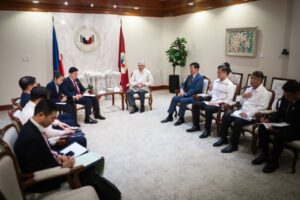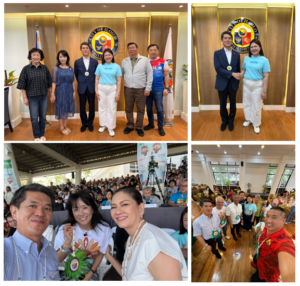
“Pinyapel” is the short term for pineapple paper, coined from the Filipino root words PINYA (pineapple) and PAPEL (paper).
Made from discarded pineapple leaves, Pinyapel is a locally processed and manufactured paper aimed at providing environmentally friendly, commercially viable solutions to single-use plastics.
Pinyapel is also the adopted name of the project initiated under the Materials Research and Development Program by the Design Center of the Philippines. The program explores the potential of agricultural waste and overlooked resources as raw materials for various product applications.




Pinyapel’s manufacturing evolution from wastes (pineapple fibers and leaves) to material components (pineapple paper, pulp, yarn, rope, fabric, board, biocomposite tile, and other pineapple derivatives) to commercial end products (handwoven bags and wallets, handmade vases and tapestries, planters, lamps, mats, apparel, sneakers, printed packaging, and decorative tiles) is a groundbreaking narrative now bared at its Special Setting Exhibition at the Philippine Senate.
Launched early this week, the Senate Exhibition is not merely a display but a living testament to the collective journey towards sustainable and innovative development, according to Senate President Pre Tempore Loren Legarda, who is also the Chairperson of the Senate Committee on Culture and the Arts.


Pinyapel is seen to align with the zero-waste lifestyle and empower Filipinos to veer away from the throw-away mentality rampant in the culture.
“As we gather here during the Zero Waste Month and the Philippine Tropical Fabric Month, it’s crucial to underscore Pinyapel’s commitment to closing the waste loop through its quadruple bottom line approach to circular design, deeply rooted in the ‘Malasakit’ principle of the Design Center of the Philippines—an ethos that embraces compassionate environmental stewardship and sense of accountability towards protecting and preserving the country’s ecosystems,” the Senator said during the launch.
Having closely collaborated with the Design Center of the Philippines on various projects, she added, “I’ve witnessed firsthand the transformative power of design in ensuring the competitiveness of our products. With the inherent ingenuity of the Filipino people, we stand at the forefront of ushering in a new era of production and innovation that seamlessly aligns with our natural resources and biodiversity.”
Pinyapel’s collaboration with manufacturers across the Philippines has so far resulted in the development of eighty-five (85) artisanal and industrial products.
As the principal author and co-sponsor of the Philippine Innovation Act, which recognizes innovation’s role in transforming the Philippines into a competitive nation, the Senator urges all stakeholders to foster an ecosystem that nurtures innovation and supports sustainable economic growth.

Currently, Pinyales has the following product development partners: Asao Shimura, Creative Definitions, GSG by Flora Creatives, I Am Juana Clothing, Ideatechs Packaging Corp., MASAECO Inc., Nature’s Legacy Eximport Inc., OneofT, Oro Handmade Innovations, Plastics by Manila Automat, RCB Crafts and Designs, TADECO Home, and WeaveManila Inc.


